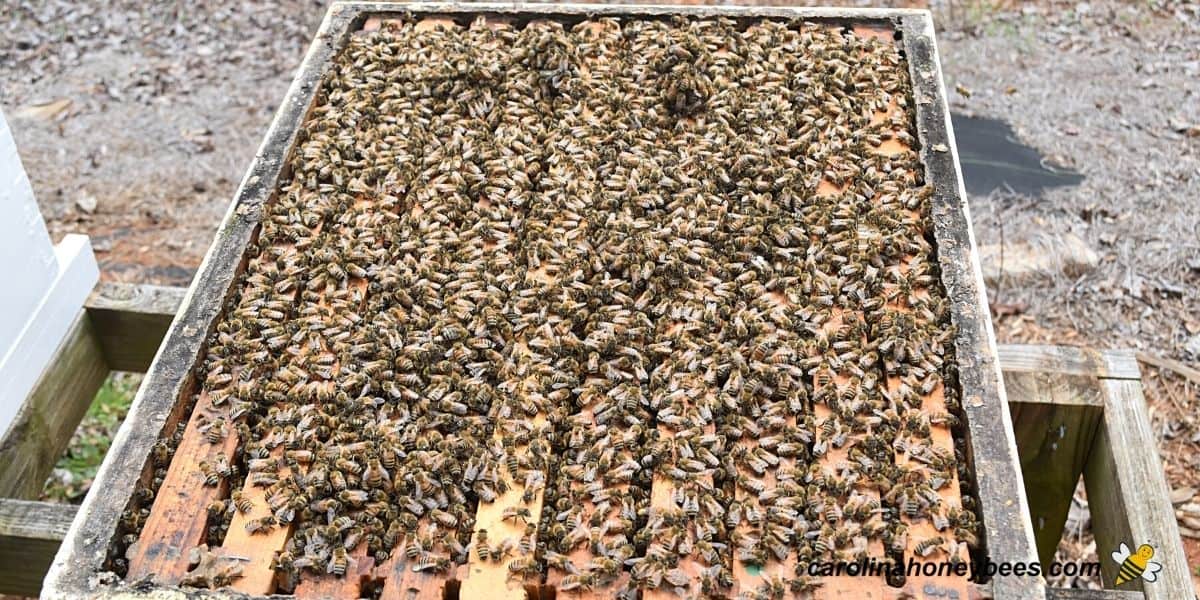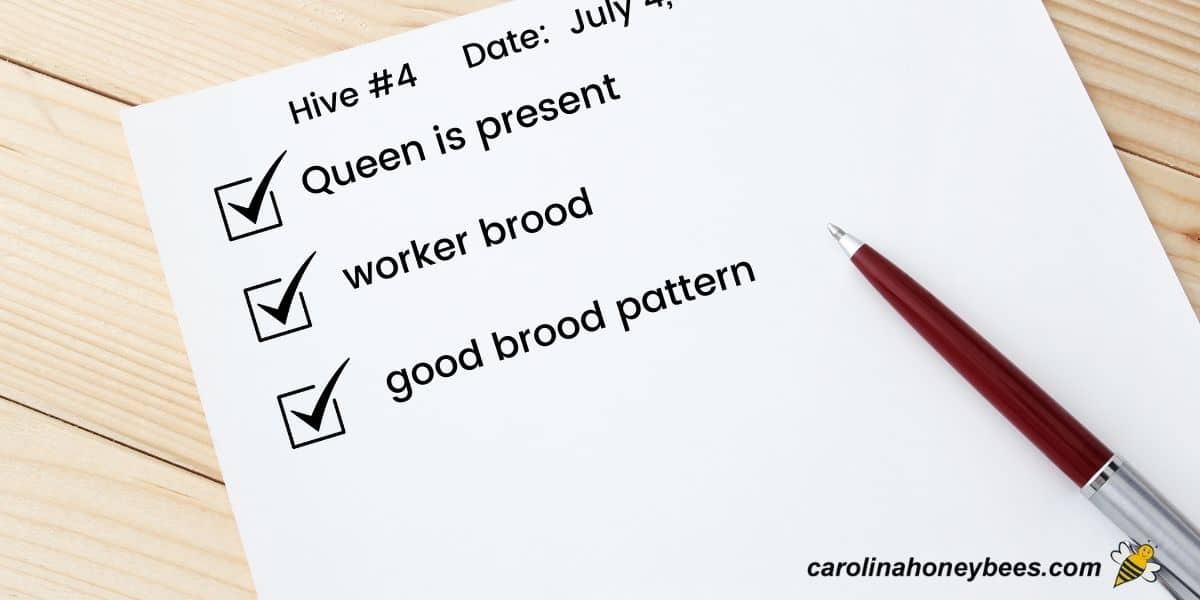Beehive Record Keeping
Are beehive records really important? Yes, I think so. While even experienced beekeepers can learn from hive notes, it is even more important for beginners. Good beekeeping records promote a better understanding of the dynamics of the hive and help you know if your colony is on track for the year.

Sure, having a note book is not for everyone. But, you may find that it is well worth your time to keep a beekeeper’s log or records of colony conditions. They are so many factors to remember in hive management. If you have more than 1 colony, it is almost impossible to remember all the details.

Bricks for Hive Status
Bricks? Yes, bricks. Have you ever been to someone’s bee yard and seen bricks on top of the hive? Some lay flat, while others are standing on end? Yea?
Maybe they are there to hold on the hive top during windy weather. But for most of us, they serve another function. They tell us at a glance – something about the last known condition of that hive.
Some beekeepers have elaborate methods of using bricks to indicate hive status. One brick laying down flat-all is good.
One brick laying on its side, this colony has a problem that needs monitoring. A brick standing on end, this colony is queen-less and requires immediate attention. At least that is the system that I used and still do sometimes.
Every beekeeper has a different brick system. If you really want to make a beekeeper angry, move around the rocks (or bricks).
This is the limitation of the brick system. If someone or something moves your bricks, your data is lost.
Hive Tracking Software
Technology has arrived in the world of beekeeping. Many beekeepers enjoy using online hive management software or apps on their phones.
This method allows them to have concise records handy no matter where they are. One of the most well know ones is Hive Tracks.
This is a great method of keeping records if you can keep up with it. I have great fun putting in the information during the Winter when I am not working bees. However once bee season starts, I never seemed to have time to input the inspection information.
Paper Records
After trying every beekeeping system out there, I have come back to a notebook or journal. I have notebooks dating back over many years.
And each one tells a story of my beekeeping journey for that year. I like to take a digital voice recorder with me to the bee yard. This allows me to record digital notes that I will then transcribe into my journal or paper notebook.
I have booklets with records of hive inspections dating back over 15 years. Occasionally, I take them out and thumb through the pages.
In the beginning written accounts of each first hive inspection after installation helped me learn what to look for.
Also, how to note beekeeping techniques that worked! As well as, plans that failed miserably. We all strive to lessen the number of repeated beekeeping mistakes in our lives.

Your Beekeeping Journal
You can buy beekeeping record books that are ready to use. They can be helpful if you are a bit unsure of what conditions are most important to track.
Using my old notebooks as a guide, I have created a beekeeping journal. Includes: *a beekeeper’s calendar *hive inspection sheets *monthly notes and more. You can download the inexpensive version or order a printed on from Amazon.
While you may think you will be able to keep track of the date when you last inspected your hive- LOL, I can say that you probably will not!
It is important to have an inspection plan before opening the hive. This is difficult to do if you are not 100% certain of colony conditions from the last visit.
Anytime you see something that concerns you, make a note to recheck soon. A quick glance at your notes will prepare you for today’s inspection.

Benefits of Good Hive Records
While we can learn a lot from observing the colony entrance, we still need to look inside the hive periodically.
However, any time that we open a beehive, it causes stress to the colony. Honey bees are not very fond of having the roof of their home removed.
Plan Inspections
As your experience grows, a good hive inspection log will help you determine when to open the hive. Your chart is a definite notation of when you last inspected the hive and the conditions inside.
Does the colony have a good queen? Do you see honey and pollen? Any signs of bee pests? We must look inside to access these conditions.
For example: your hive notes from a week ago says that you saw a laying queen. And, today you see a good brood pattern with some fresh larvae.
It might not be as important to keep the hive open longer to do a visual check of every frame to find the queen – you saw her recently and see evidence now.
Access to former hive inspection notes gives us an idea of what to expect. Did this bee colony have a possible problem during the last inspection?
I use notes from my Beekeeping Journal every time before going to the bee yard. Beekeepers with many hives (or short memories) often find it difficult to remember which hive needs what. “ i.e. Was the yellow hive queenless or was it the green one ?.”
Helps New Beekeepers Learn
Beehive records are especially helpful for a beginner beekeeper. There are so many things to remember.
It is very difficult to understand all the beekeeping terminology and the inspection “what ifs”. Your notes can help you learn as you read through them back in the comfort of your home.
In my early years of beekeeping, it really helped me learn and retain knowledge about my bees. Repetition is good for retaining information. As I grow older it seems that they are helping me even more.. LOL
By looking back at your records from previous new colonies, you will better understand hive development.
How long did it take your last colonies to fill out the beehive box? What time of year did you first notice capped brood, etc.

Beekeeping Log Book Templates
Your hive inspections sheets can be as simple or as complicated as you wish. Over time, a beekeeper learns which factors of hive management are most important.
However, there are some basic hive conditions that every beekeeper needs to know.
- Does the colony have a visible queen bee?
- Is the queen laying a good brood pattern?
- Is the colony bringing in pollen and nectar?
- Any signs of wax moth damage?
- What about signs of common honey bee diseases?
- Has the colony been tested for mites? When did you treat your bees for mites? With What?
Final Thoughts
No matter which method you choose to use, having a good bee hive record keeping system is important. Of course, you can use any notebook for your beehive record keeping but it sure is nice to have it in a concise format. The most important thing is to write down those notes. Bricks to Apps to Journals – all can provide a tracking system to help you be a better beekeeper.

